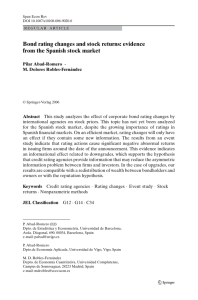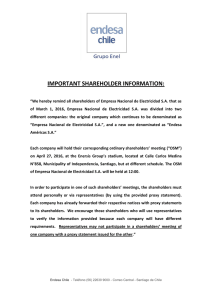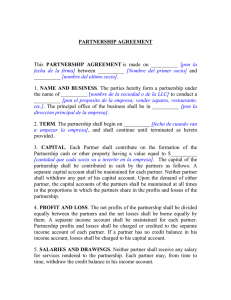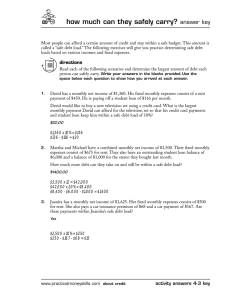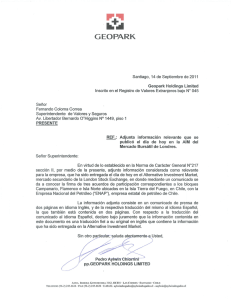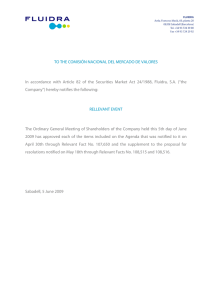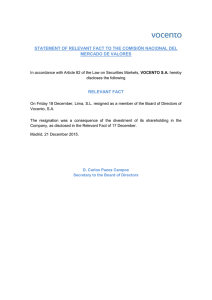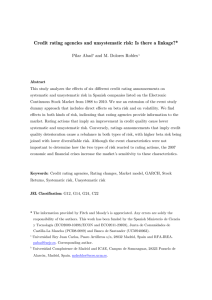Empresa Nacional del Petroleo
Anuncio
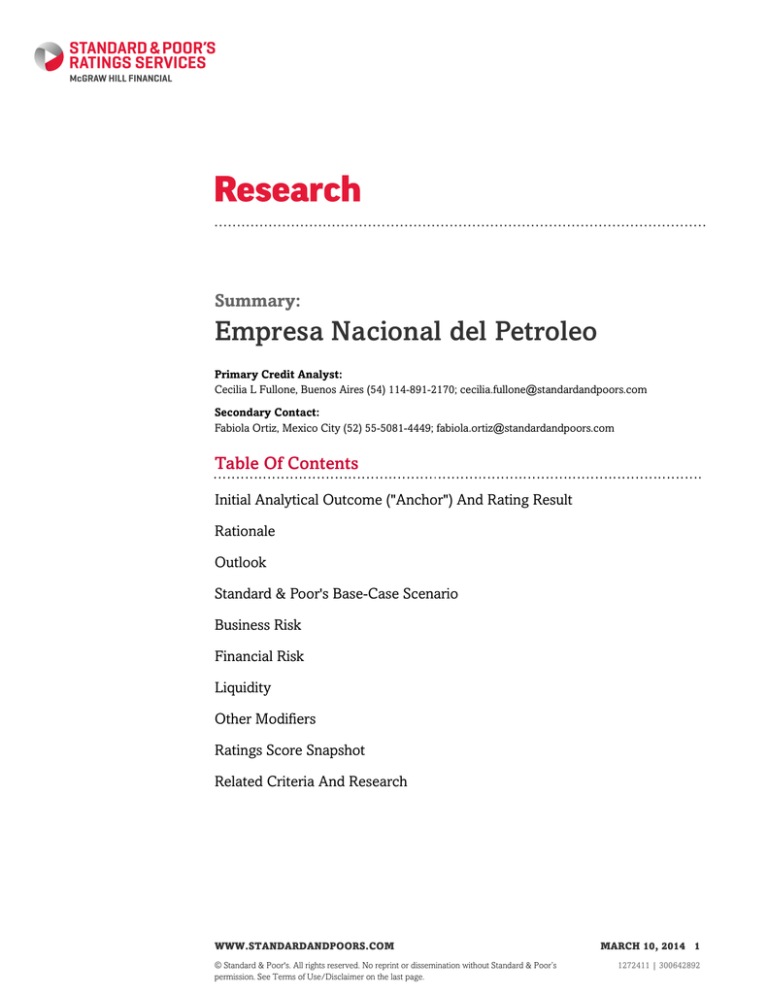
Summary: Empresa Nacional del Petroleo Primary Credit Analyst: Cecilia L Fullone, Buenos Aires (54) 114-891-2170; cecilia.fullone@standardandpoors.com Secondary Contact: Fabiola Ortiz, Mexico City (52) 55-5081-4449; fabiola.ortiz@standardandpoors.com Table Of Contents Initial Analytical Outcome ("Anchor") And Rating Result Rationale Outlook Standard & Poor's Base-Case Scenario Business Risk Financial Risk Liquidity Other Modifiers Ratings Score Snapshot Related Criteria And Research WWW.STANDARDANDPOORS.COM © Standard & Poor's. All rights reserved. No reprint or dissemination without Standard & Poor’s permission. See Terms of Use/Disclaimer on the last page. MARCH 10, 2014 1 1272411 | 300642892 Summary: Empresa Nacional del Petroleo BBB-/Stable/-- Corporate Credit Rating Profile Assessments BUSINESS RISK FAIR Vulnerable FINANCIAL RISK Excellent HIGHLY LEVERAGED Highly leveraged Minimal Initial Analytical Outcome ("Anchor") And Rating Result Our 'BBB-' rating on Empresa Nacional de Petroleo (ENAP) is derived from: • Our anchor of 'b' based on our "fair" business risk and "highly leveraged" financial risk profile assessments for the company; • On an aggregate basis, no impact from modifiers. The one- notch negative adjustment due to quality of capital structure offsets the one-notch positive adjustment as a result of the company's "positive" comparable rating analysis; and • Five notches of uplift from the 'b' stand-alone credit profile (SACP), reflecting our view that there is a very high likelihood that the Republic of Chile (foreign currency: AA-/Stable/A-1+; local currency: AA+/Stable/A-1+) would provide timely and sufficient extraordinary support to the company in the event of financial distress. Rationale Business Risk: Fair Financial Risk: Highly leveraged • Strong dominant position in the domestic refining market; • Exposure to volatile commodity prices and refining margins; and • Below average profitability compared with its international peers. • Generally weak profitability and cash-flow generation; and • Very high debt levels that result in weak capital structure. WWW.STANDARDANDPOORS.COM MARCH 10, 2014 2 © Standard & Poor's. All rights reserved. No reprint or dissemination without Standard & Poor’s permission. See Terms of Use/Disclaimer on the last page.1272411 | 300642892 Summary: Empresa Nacional del Petroleo Outlook: Stable The stable outlook reflects our expectation that ENAP will continue to play a very important role in Chile's energy policy. Downside scenario Unless we perceive that ENAP has become less important to the Chilean government, a downgrade is unlikely. ENAP's SACP would have to drop by two notches (to below 'b-') in order to lead to a downgrade. Upside scenario Any rating upside is limited at this point, and would depend on a significant improvement in the company's SACP, for example, if it's able to materially reduce debt. We might raise the SACP by one notch if the company generates positive free operating cash flow on a sustained basis. Standard & Poor's Base-Case Scenario Our base case suggests that the firm's free operating cash flows will be marginally positive in 2014, and probably turn negative in 2015. As a result, we believe it is unlikely that the company will lower its debt significantly, nor do we expect it to improve its financial metrics unless the company receives a capital infusion from the government. Assumptions • Average actual product price that ultimately depends on our long-term assumptions for Brent crude oil at $100 per barrel in 2014 and $95 per barrel in 2015; • Adjusted EBITDA margin of about 5%; • Annual capital investments for approximately $300 million in 2014 and 2015; and • No material debt reductions. Key Metrics FFO/Debt 2013A 2014E 2015E 7% 5%-10% 0%-5% Debt/EBITDA 6.6x 7.0x-9.0x 8.0x-10.0x FOCF (Mil. $) 236 (50)-100 (150)-(50) A--Actual. E--Estimate. Business Risk: Fair We assess ENAP's business risk profile as "fair" mainly reflecting its inherent exposure to the volatility and cyclicality in refining margins, which is partially compensated by the company's strong competitive position in the domestic market. ENAP enjoys a dominant position in Chile, being the leading supplier of the domestic market and holding 100% of Chile's refining capacity. We expect ENAP to maintain its dominant refining position in Chile given the fact that the WWW.STANDARDANDPOORS.COM MARCH 10, 2014 3 © Standard & Poor's. All rights reserved. No reprint or dissemination without Standard & Poor’s permission. See Terms of Use/Disclaimer on the last page.1272411 | 300642892 Summary: Empresa Nacional del Petroleo construction of a new refinery in Chile is unlikely. Additionally, because the company already operates under an import parity price regime, pricing pressures from increased imports should not have a significant impact on margins. During 2013, ENAP produced 73.3 million barrels of refined products, representing a 63% market share. Imports from the international spot market provide the remainder. Growth in Chile's refined product market will likely continue to be linked to economic growth. Despite having its own E&P operations, ENAP is dependent on and exposed to crude oil imports (mainly from Brazil, Colombia, Ecuador and Argentina). ENAP's domestic production is insufficient for the company's crude oil needs, and we do not expect this to change significantly in the next few years. In 2013, ENAP produced 19.2 million boe (66% oil, 34% gas). Its proved reserves were 118 million boe as of Dec. 31 2013. Financial Risk: Highly leveraged ENAP's weak profitability, high debt and generally very limited or negative free operating cash flow generation underpins its "highly leveraged" financial risk profile. In 2013, ENAP improved its operating performance, although its debt levels continued to be high. The company's adjusted EBITDA rose to $544 million from negative levels in 2012, as the company implemented measures to improve its efficiency. In addition, in 2013, and as part of its strategy to divest non-strategic assets, ENAP sold its 49% stake in its fuel distribution business in Peru and Ecuador for $308 million. The company used the funds from the sale to reduce debt, which was $4 billion as of Dec. 31, 2013, compared with $4.3 billion a year earlier. Liquidity: Less than adequate Qualitative aspects included in our assessment As we expect the firm's free cash flow to be just marginally positive in the next 12 months, there will likely be no room for significant debt reduction unless ENAP receives a capital infusion from the government. Therefore, we believe ENAP will continue to refinance most of its short-term maturities. We do not see this as a major risk given the company's very strong access to refinancing markets and sound relationship with banks. Principal Liquidity Sources Principal Liquidity Uses • As of Dec. 31, 2013, ENAP had about $469 million in cash and short-term investments; and • Positive funds from operation were $200 million to $300 million. • As of Dec. 31, 2013, ENAP's short-term maturities totaled $485 million; and • Capital expenditures (capex) will be about $300 million in 2014; however, we believe ENAP might lower its capex to $200 million if there is a severe industry or financial market downturn. WWW.STANDARDANDPOORS.COM MARCH 10, 2014 4 © Standard & Poor's. All rights reserved. No reprint or dissemination without Standard & Poor’s permission. See Terms of Use/Disclaimer on the last page.1272411 | 300642892 Summary: Empresa Nacional del Petroleo Other Modifiers We assess the company's quality of capital structure to be "negative," due to its debt maturities concentration within a five-year time horizon in relation to its liquidity sources and the company's leverage profile. On the other hand, we assess our comparable rating analysis on ENAP as positive, because the company's access to credit markets exceeds that of other issuers in the same rating category, due to its government ownership. On an aggregate basis, the modifiers do not have an impact on the rating. Ratings Score Snapshot Corporate Credit Rating: BBB-/Stable/-Business risk: Fair • Country risk: Low • Industry risk: Moderate • Competitive position: Fair Financial risk: Highly leveraged • Cash flow/Leverage: Highly leveraged Anchor: b Modifiers • • • • • • Diversification/Portfolio effect: Neutral Capital structure: Negative (-1 notch) Liquidity: Less than adequate ("no impact") Financial policy: Neutral ("no impact") Management and governance: Fair ("no impact") Comparable rating analysis: Positive (+1 notch) Stand-alone credit profile: b • Sovereign rating: foreign currency: AA-/ Stable/A-1+; local currency: AA+/Stable/A-1+ • Likelihood of government support: Very high, (+5 notches from SACP) Related Criteria And Research Related Criteria • Methodology And Assumptions: Liquidity Descriptors For Global Corporate Issuers, Jan. 2, 2014 • Key Credit Factors For The Oil And Gas Exploration And Production Industry, Dec. 12, 2013 • Corporate Methodology, Nov. 19, 2013 WWW.STANDARDANDPOORS.COM MARCH 10, 2014 5 © Standard & Poor's. All rights reserved. No reprint or dissemination without Standard & Poor’s permission. See Terms of Use/Disclaimer on the last page.1272411 | 300642892 Summary: Empresa Nacional del Petroleo • Corporate Methodology: Ratios And Adjustments, Nov. 19, 2013 • Key Credit Factors: Criteria For Rating The Global Oil Refining Industry, Nov. 28, 2011 • Rating Government-Related Entities: Methodology And Assumptions, Dec. 9, 2010 WWW.STANDARDANDPOORS.COM MARCH 10, 2014 6 © Standard & Poor's. All rights reserved. No reprint or dissemination without Standard & Poor’s permission. See Terms of Use/Disclaimer on the last page.1272411 | 300642892 Copyright © 2014 by Standard & Poor's Financial Services LLC (S&P), a subsidiary of The McGraw-Hill Companies, Inc.All rights reserved. No content (including ratings, credit-related analyses and data, model, software or other application or output therefrom) or any part thereof (Content) may be modified, reverse engineered, reproduced or distributed in any form by any means, or stored in a database or retrieval system, without the prior written permission of S&P. The Content shall not be used for any unlawful or unauthorized purposes. S&P, its affiliates, and any third-party providers, as well as their directors, officers, shareholders, employees or agents (collectively S&P Parties) do not guarantee the accuracy, completeness, timeliness or availability of the Content. S&P Parties are not responsible for any errors or omissions, regardless of the cause, for the results obtained from the use of the Content, or for the security or maintenance of any data input by the user. The Content is provided on an “as is” basis. S&P PARTIES DISCLAIM ANY AND ALL EXPRESS OR IMPLIED WARRANTIES, INCLUDING, BUT NOT LIMITED TO, ANY WARRANTIES OF MERCHANTABILITY OR FITNESS FOR A PARTICULAR PURPOSE OR USE, FREEDOM FROM BUGS, SOFTWARE ERRORS OR DEFECTS, THAT THE CONTENT’S FUNCTIONING WILL BE UNINTERRUPTED OR THAT THE CONTENT WILL OPERATE WITH ANY SOFTWARE OR HARDWARE CONFIGURATION. In no event shall S&P Parties be liable to any party for any direct, indirect, incidental, exemplary, compensatory, punitive, special or consequential damages, costs, expenses, legal fees, or losses (including, without limitation, lost income or lost profits and opportunity costs) in connection with any use of the Content even if advised of the possibility of such damages. Credit-related analyses, including ratings, and statements in the Content are statements of opinion as of the date they are expressed and not statements of fact or recommendations to purchase, hold, or sell any securities or to make any investment decisions. S&P assumes no obligation to update the Content following publication in any form or format. The Content should not be relied on and is not a substitute for the skill, judgment and experience of the user, its management, employees, advisors and/or clients when making investment and other business decisions. S&P’s opinions and analyses do not address the suitability of any security. S&P does not act as a fiduciary or an investment advisor. While S&P has obtained information from sources it believes to be reliable, S&P does not perform an audit and undertakes no duty of due diligence or independent verification of any information it receives. S&P keeps certain activities of its business units separate from each other in order to preserve the independence and objectivity of their respective activities. As a result, certain business units of S&P may have information that is not available to other S&P business units. S&P has established policies and procedures to maintain the confidentiality of certain non-public information received in connection with each analytical process. S&P may receive compensation for its ratings and certain credit-related analyses, normally from issuers or underwriters of securities or from obligors. S&P reserves the right to disseminate its opinions and analyses. S&P's public ratings and analyses are made available on its Web sites, www.standardandpoors.com (free of charge), and www.ratingsdirect.com and www.globalcreditportal.com (subscription), and may be distributed through other means, including via S&P publications and third-party redistributors. Additional information about our ratings fees is available at www.standardandpoors.com/usratingsfees. WWW.STANDARDANDPOORS.COM MARCH 10, 2014 7 1272411 | 300642892
